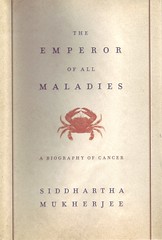 Scanned Image 1
Scanned Image 1 by
hankins.greg, on Flickr
I haven't seen anyone review Siddartha Mukherjee's
"The Emperor of All Maladies: A Biography of Cancer" on marrowforums yet, so I thought I'd weigh in and alert you to its presence.
Of course, some of us here don't have cancer
per se, but, either way, the book is absolutely fascinating.
It begins in Boston, in the pathology lab of a prim doctor of German heritage named Sydney Farber, who decides he wants to try to treat pediatric leukemia with a new drug and winds up inventing the Jimmy Fund and it's famed cancer clinic in Boston. Farber went on to play a pivotal role in the US-Congress-funded "War on Cancer" in the 1970s.
But Mukherjee's book is not a biography of Farber. It's a biography of cancer; and it jumps back and forth in time, acquainting us with the always-evolving human understanding of the disease and never-ending fight to treat it effectively. The author is "lab rat," doing research on leukemia at Columbia University Medical Center, so bone marrow failure diseases take a front and center role in the book -- as they have in cancer research and treatment.
He takes the reader from the first couple of descriptions of what would be called "leukemia" in the medical literature, right up to the current recognition that cancer is a disease based on gene mutations and disruption of key communication pathways within the cell. Along the way he explores the origins and fate of various approaches to treating the disease, including radical mastectomies for breast cancer (and equally radical surgical approaches to other cancers) and increasingly toxic chemotherapies. There's also a great section on how the patently obvious (from the data) link between smoking and lung cancer took decades to have any impact on the behavior of governments or populations.
I read a lot of non-fiction, and this book, hands-down, one of the best I have read. The early going is very, very readable. The last twenty percent, once we start talking about genes and cellular pathways, is tougher going, simply because the material itself is so complex.
At nearly 500 pages, it will keep you occupied for several nights. It's out in paper and hardback and all the usual electronic formats. The audiobook is available, as well, though the reader in that version hasn't gotten sterling reviews.
Highly, highly recommended.
Take care!
Greg